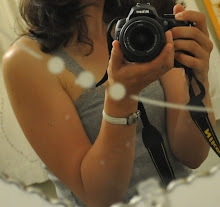Close Encounters
She leans into the phone camera, comes close, looks like she’s
trying to step inside and emerge on the other side, my side. Her close-up eye
looks gigantic, and millimetres from where I sit. “Tijanaaaa,” she says, with
the drawling inflection of a 2.5-year-old, but with the perfect pronunciation of my
name: the stress on the first syllable (something most English speakers simply
don’t seem capable of doing, not to mention French speakers), and a
dento-alveolar (as opposed to dental) [t]. “How pretty is your shirt,” she
says, some sounds mumbled a little. She’s in the “self-awareness stage,” where
she’s acutely aware of what she looks like, what she’s wearing, and how pretty
and acknowledged it is – and she’s paying attention to what image others are
putting forward of themselves too.
“It’s
a dress, actually,” I say, and angle my camera so she can see all of it. She
eyes it for a moment, but by now she’s lost interest and dashes off to do who
knows what in another room, and I’m left with the lingering feeling that what
just happened was a curious close encounter between my niece and my mother,
whose old summer dress I’m wearing. When she died (14 years ago today), I picked some of her things
and brought them with me; most of them are sitting in bags on wardrobe shelves –
but when the first heatwave of the year struck a few days ago, I remembered
this light-fabric simple summer dress, and pulled it out from there. One other
thing from those piles that I remembered – but left untouched – is a joyfully orange
t-shirt, which is actually mine. It’s there with the selection of my mother’s
garments (a couple of skirts that fit me, a pair of pyjamas, a few shirts, a
couple of light scarves…) just because she had ironed it for me and folded it
neatly the night before I left at the end of my summer holiday that year, and a
week before she died. I never unfolded it since.
I remember her well in this dress: moving
around the apartment doing chores – cooking, washing, ironing… She was someone
with an inexhaustible source of tenderness (is that something you learn from
your parents, or is it something that you either have or don’t, or is it
perhaps something you pick up along your particular path past childhood?). And
even though in her early 60s she had a peculiar aversion to the idea of being
called “grandma” one day (perhaps a natural first real fear of ageing?), I know
she would dissolve unconditionally like a sugar cube in chamomile tea at the very
sight of her granddaughter. Of course. The first thing to come to my mind when I
think of my mother is her softness for all things small (and especially
animals), and then the gentleness of her touch (pure grace in a tactile form;
perhaps musicians are particularly good at conjuring this grace at their
fingertips?). If there is such a thing as a person’s grief which hovers around
intangibly and inexpressibly after their death, I feel it; I feel her
grief for never having met her son’s daughter, with her untameable ponytails,
her baby-fat arms, her bright little voice, her girly dose of whimsy, and – at some
infinitesimal and evasive moments – a quick flash of an uncanny resemblance to
herself. And I wonder if that grief will ever cease to be a part, however
delicate and fleeting, in what I feel when I’m talking to Zozi. But, as simple
as it might sound, that is perhaps the core essence of parenthood: you breathe
your life into your children, and they carry it on, in the emotional landscape
of their own lives.
She’s back from the other room now. She had seen me with the
camera in my hands a little bit earlier, taking pictures of our Skype
conversation, so she brought her plastic phone from one of the many vats with
toys in the children’s room to take some pictures too. And she does: she points
the phone at the screen, and giggles, and takes a shot for posterity.




0 Comments:
Post a Comment
<< Home